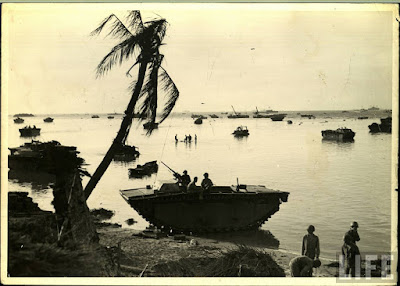Håfa Na Klasen Liberasion #26: Real Liberation Lies Ahead
-->
Another Liberation Day has come and gone, and with each
passing year, more and more questions emerge about the meaning of this
important event and our relationship to it. More people seem willing to
question whether or not the US return to Guam in 1944 was a liberation, but for
each person who earnestly asks that question, there is usually another who
raises their voice in indignant defense of the liberation, demanding that it
not be questioned. For them it is a sacred event for our elders and should require
our patriotism and gratitude and nothing more.
One of the misconceptions that people have in life, is the
notion that something sacred should not be questioned or analyzed. I would
propose instead that something sacred holds such depth and power, that its
meaning can sustain questioning or scrutiny. If people shout down those who
have earnest questions about Liberation Day in the name of it being sacred,
more likely they are scared of how the concept will fall apart once
interrogated.
I have documented several hundred Liberation Day stories
from Chamorro elders, and I can say for certain that it was a type of
liberation, but it was not a liberation in the way it as come to be conceived
in the decades since.
The emotional liberation was real. It should be
commemorated, the bonds between our elders and American soldiers were powerful.
But to extend beyond that means to turn a beautiful and enriching experience
into the raw materials to justify Guam’s colonial status quo. But what most
people seem to celebrate each July on island, with talk of freedom and liberty
isn’t what took place in 1944. That would be a political liberation.
To be considered a political liberation, we have to delve
into the intent of what took place and also what happened afterwards. For the
US return to be this type of liberation, the safety of the Chamorro people had
to be the priority and that any interests of the US had to be minor or
non-existence. The benefits that Chamorros received cannot simply be
collateral, they had to be the goal.
This also means understanding what happened afterwards,
since this tends to indicate a great deal about what the intent was, even if
rhetoric may mystify it. Did the US return led to an end to Guam’s colonial
status and the development of a relationship with it and the rest of the world
predicated on principles of democracy, liberty and freedom? This only happened
to a marginal extent and in truth, the US took advantage of the feelings of
gratitude by Chamorros to illegally seize their lands. You might argue that
their land was worth the price for their lives, but that isn’t liberation, not
even close. To make that argument cheapens what a real and true liberation is
supposed to be.
With so many members of the greatest generation passing
away, we should take seriously their sacrifices and their struggles. We should
take seriously the legacy of that liberation, by acknowledging what did happen,
what did not happen and what should still happen.
This means we should not refer to the American retaking of
the island in 1944 as a liberation, but instead see it as a potential start of
that journey, a process that remains decades later unfinished. This is
something several American soldiers who liberated the island have themselves
commented on.
In the name of all those who suffered and sacrificed, the
United States government should allow the work started by those soldiers to be
finished, and allow a true liberation, the decolonization of the island of Guam
to take place.




Comments